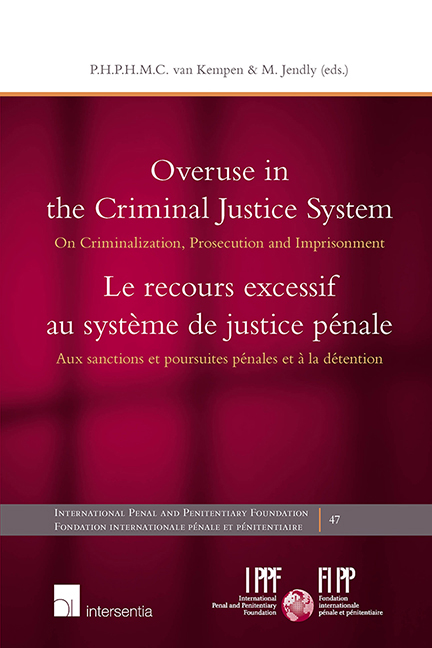Book contents
- Frontmatter
- Dedication
- Contents
- Acknowledgements
- Remerciements
- PART I INTRODUCTORY SYNTHESIS AND ANALYSES 1ÈRE PARTIE. SYNTHÈSE ET ANALYSES INTRODUCTIVES
- PART II THEMES 2ÈME PARTIE. THÈMES
- Overuse of the Criminal Justice System: Analytical Approach, Rules and Practices
- The Overuse of Criminal Justice in the Case Law of the European Court of Human Rights
- Overuse of Criminalization: a Philosophical and Political Approach on the Latin-American Situation
- Overprosecution and Negotiated Justice in Europe
- The American Experience with the Prosecutorial Overuse of Plea Bargaining
- Overuse of Imprisonment: Statistical Analyses of Incarceration Rates Across the World
- Minimising Prisonisation and the Harms of Custody
- Criminal Policy and Imprisonment. The Case of Lithuania: Open Prisons, Prison Leave and Release on Parole
- PART III NATIONAL REPORTS 3ÈME PARTIE. RAPPORTS NATIONAUX
- The International Penal and Penitentiary Foundation: history and purpose
- La Fondation internationale pénale et pénitentiaire: histoire et objectif
- The IPPF Series
Overuse of Criminalization: a Philosophical and Political Approach on the Latin-American Situation
from PART II - THEMES 2ÈME PARTIE. THÈMES
Published online by Cambridge University Press: 26 June 2019
- Frontmatter
- Dedication
- Contents
- Acknowledgements
- Remerciements
- PART I INTRODUCTORY SYNTHESIS AND ANALYSES 1ÈRE PARTIE. SYNTHÈSE ET ANALYSES INTRODUCTIVES
- PART II THEMES 2ÈME PARTIE. THÈMES
- Overuse of the Criminal Justice System: Analytical Approach, Rules and Practices
- The Overuse of Criminal Justice in the Case Law of the European Court of Human Rights
- Overuse of Criminalization: a Philosophical and Political Approach on the Latin-American Situation
- Overprosecution and Negotiated Justice in Europe
- The American Experience with the Prosecutorial Overuse of Plea Bargaining
- Overuse of Imprisonment: Statistical Analyses of Incarceration Rates Across the World
- Minimising Prisonisation and the Harms of Custody
- Criminal Policy and Imprisonment. The Case of Lithuania: Open Prisons, Prison Leave and Release on Parole
- PART III NATIONAL REPORTS 3ÈME PARTIE. RAPPORTS NATIONAUX
- The International Penal and Penitentiary Foundation: history and purpose
- La Fondation internationale pénale et pénitentiaire: histoire et objectif
- The IPPF Series
Summary
TERMINOLOGICAL CLARIFICATION AND CONCEPTUAL DELIMITATION
The English word “overuse” can be translated into Spanish, the lecturer's mother tongue, as “excessive use” or “overwork”. Nonetheless, as this word is followed by the complement “criminalization”, it seems more appropriate to translate it as “abuse”.
Abuse or overuse is not just using something too much or using it excessively, but to use it in an improper, inadequate or unfair manner. Also the term “abuse”, in the English language, means mistreatment, wrongdoing, and it can even mean an aggression. And this is precisely the meaning of the phrase “overuse of criminalization”: an unlawful act of violence carried out by the State through its criminal laws against the citizens. Consequently, it is not merely the unnecessary use of the law to criminalize conducts or the barely quantitative censorship of this proceeding, but it is something deeper, qualitative.
There was full awareness of this fact at the founding moment of the Rule of Law, the French Declaration of the Rights of Man and the Citizen. Article 8° asserted as principle the minimal need or intervention of the state punishment: “The law shall not provide for punishments other than those strictly and obviously necessary”. The mindset of the reformers of the Enlightenment understood that an unnecessary punishment accounts for something more serious than a mere excess by the legislator, who was able to overlook the law because it was not absolutely necessary. On the contrary, it had to be considered as a tyrannical act; according to Beccaria, “an act of violence perpetrated by one or many upon a private citizen”, and in accordance with the terminology of our time, a factual imposition rather than a legal punishment. Certainly, regardless of the individual and social effects of unnecessary punishment, in the underlying abuse, the legitimacy of the criminalization of conducts, situations or individuals and, in the end, the authority of the political-legal title by virtue of which it is established by the government is at stake. The mindset of the reformers of the Enlightenment understood that an unnecessary punishment accounts for something more serious than a mere excess by the legislator, who was able to overlook the law because it was not absolutely necessary.
- Type
- Chapter
- Information
- Overuse in the Criminal Justice SystemOn Criminalization, Prosecution and Imprisonment, pp. 83 - 100Publisher: IntersentiaPrint publication year: 2019



